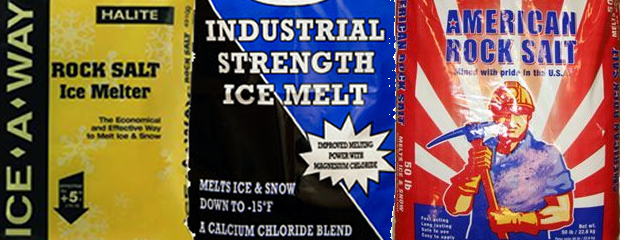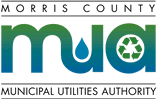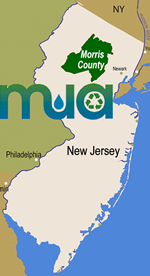Transfer Station Info (Tip Fee $113.00/ton)
- Mt. Olive Mon-Fri 7:30am-3pm; Sat 7:30am-11am
- Parsippany Mon-Fri 7am-3pm; Sat 7:30am-11am
- No Rental Trucks
- Payment by Account, Check, Credit Card. No Cash

F.A.Q. Rock Salt
The MCMUA operates one of NJ's most comprehensive household hazardous waste (HHW) programs. This F.A.Q. page and information on hazardous materials is intended as a guide about HHW materials as well as the MCMUA's HHW program. This information is a general guide and does not constitute official rule, regulation or law.
Hazardous Waste Materials
- Adhesives
- Aerosols
- Antifreeze
- Appliances (CFCs)
- Art & Crafts
- Asbestos
- Batteries (Auto & Boat)
- Batteries, Household (dry cell)
- Cell Phones
- Compressed Gas Cylinders
- Driveway Sealer
- Electronics
- Fire Extinguishers
- Fluorescents
- Gasoline
- Medical Waste
- Kerosene
- Mercury
- Motor Oil & Filters
- Muriatic Acid (HCl)
- Paints & Stains
- Pesticides
- Photo Chemicals
- Pool Chemicals
- Propane
- Rock Salt
- Smoke Detectors
- Solvents
- Wood with Lead Paint
There are two common types of rock salt that are described below. These rock salts are used to melt snow and ice in the winter. They are also commonly used in water softeners. Both types of rock salt are not considered hazardous should be disposed of in the regular garbage.
- Sodium Chloride – a/k/a Halite; is non-hazardous but will react with strong acids to generate HCl and strong oxidizing agents to generate Cl2.
- Calcium Chloride – This material is Dangerous
When Wet. Therefore contact with water generates heat. In the presence of
moisture, the material is corrosive to aluminum, zinc and tin. Keep away from acids; gives off heat.
Note: Crystal solar salt specifically for softening water is not considered hazardous and should be discarded with the regular garbage. If you are removing a water softener with a slurry of this crystal salt mixed with water, drain the water from the mixture and dispose of the solids in the garbage.


